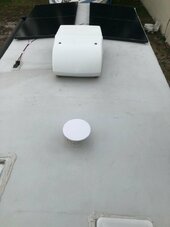I am hoping to design/price out a system for my mother-in-law with only one or two 500W (if they will fit, less W if space is limited) on top of the van, so I would like to save every W possible. This means removing the inverter from the equation as it would be mostly running electronics that operate on DC, so the conversion from DC to AC and back to DC seems completely ridiculous and unnecessary as it increases heat & noise output and increases idle consumption. We already have a 12V fridge/freezer that she has used in the past when the power goes out so we can re-use that for the van. The small electronics aspect I think I can cover on my own with various 12V to 19V adapters for the TV & laptop and then 12V-12V adapters for any remaining 12V electronics like 4G/5G router, the existing 12V mini fridge (which may be able to operate at up to 14.4V but I will have to research that), and a stereo system & light strips.
I am looking for advice from people who have installed 12V inverter-less van or small RV systems that have ran appliances like an electric kettle, portable AC, coffee maker, and possibly a small cooktop. High amp draw 12V items would all be ran as physically close to the 12V battery as possible (or batteries in parallel to increase amp output) since it would require large AWG cables (which I am fine with to keep the system inverter-less and 12V for everything else). I have heard of the Ecoflow Wave portable AC but it is somewhat expensive and I wasn't sure if there were other lower-cost options. All in all, appliances as stated above are not strictly required, but I would love to know if it is possible to source/install (relatively) affordable 12V versions of the above appliances and if anyone here as experience with it.
I am looking for advice from people who have installed 12V inverter-less van or small RV systems that have ran appliances like an electric kettle, portable AC, coffee maker, and possibly a small cooktop. High amp draw 12V items would all be ran as physically close to the 12V battery as possible (or batteries in parallel to increase amp output) since it would require large AWG cables (which I am fine with to keep the system inverter-less and 12V for everything else). I have heard of the Ecoflow Wave portable AC but it is somewhat expensive and I wasn't sure if there were other lower-cost options. All in all, appliances as stated above are not strictly required, but I would love to know if it is possible to source/install (relatively) affordable 12V versions of the above appliances and if anyone here as experience with it.



